Assessment of CHCECE003: Providing Care for Children Certificate III
VerifiedAdded on 2023/06/18
|68
|12183
|395
Homework Assignment
AI Summary
This document presents a student's solution to an assessment task for CHCECE003 Provide care for children, a unit within the CHC30113 Certificate III in Early Childhood Education and Care. The assessment includes case studies involving children with specific needs, such as a child with an imperforate anus and a family consistently sending children to the service without hats. The solutions address strategies for promoting understanding and acceptance among children, managing toileting needs with sensitivity, applying the Early Childhood Australia Code of Ethics, identifying relevant policies and procedures under the National Quality Framework, and involving parents in managing their child's condition. The assessment also explores effective communication with parents regarding sun safety and appropriate attire for children. Desklib provides a platform for students to access various study tools, including past papers and solved assignments.
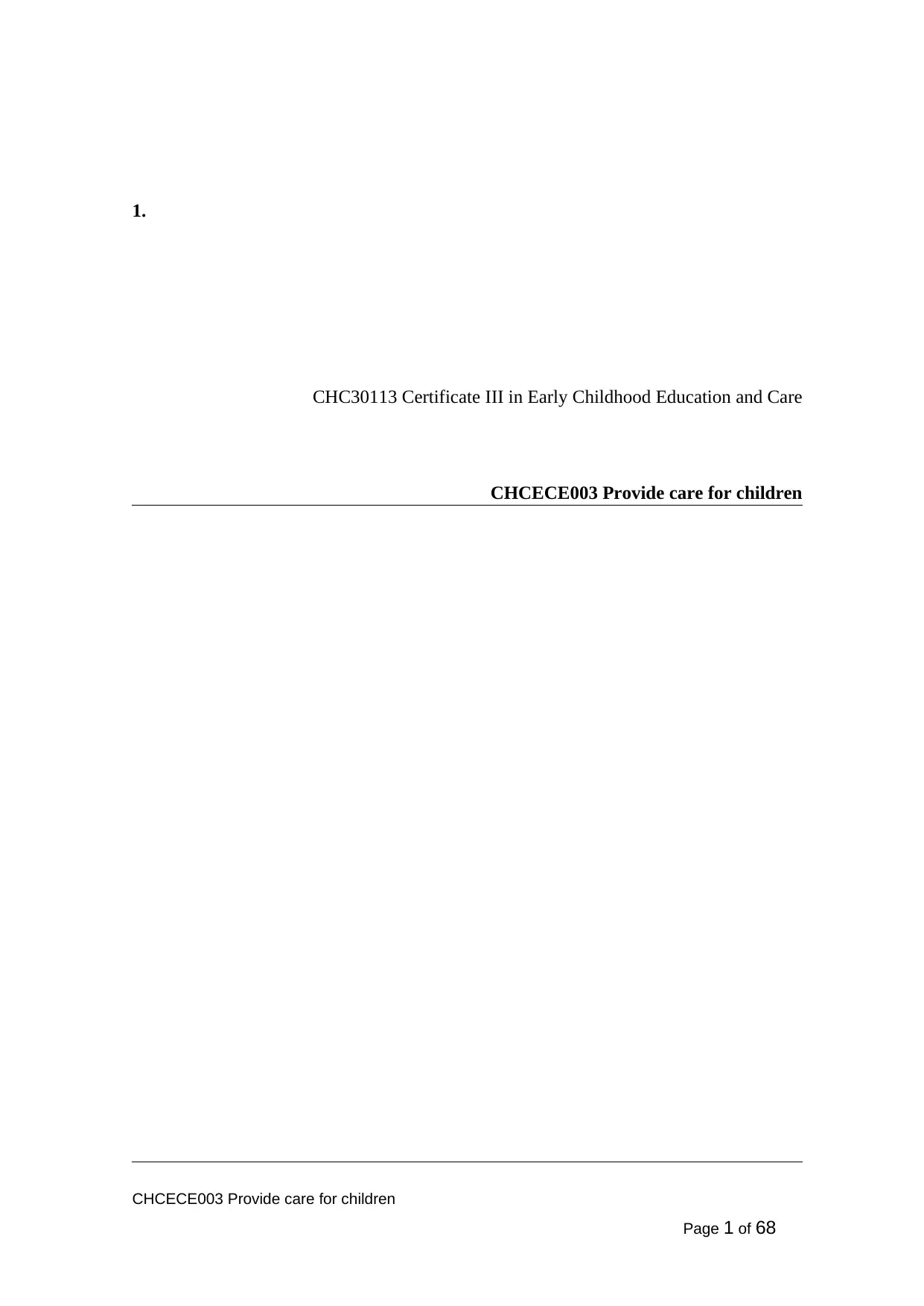
1.
CHC30113 Certificate III in Early Childhood Education and Care
CHCECE003 Provide care for children
CHCECE003 Provide care for children
Page 1 of 68
CHC30113 Certificate III in Early Childhood Education and Care
CHCECE003 Provide care for children
CHCECE003 Provide care for children
Page 1 of 68
Paraphrase This Document
Need a fresh take? Get an instant paraphrase of this document with our AI Paraphraser

2
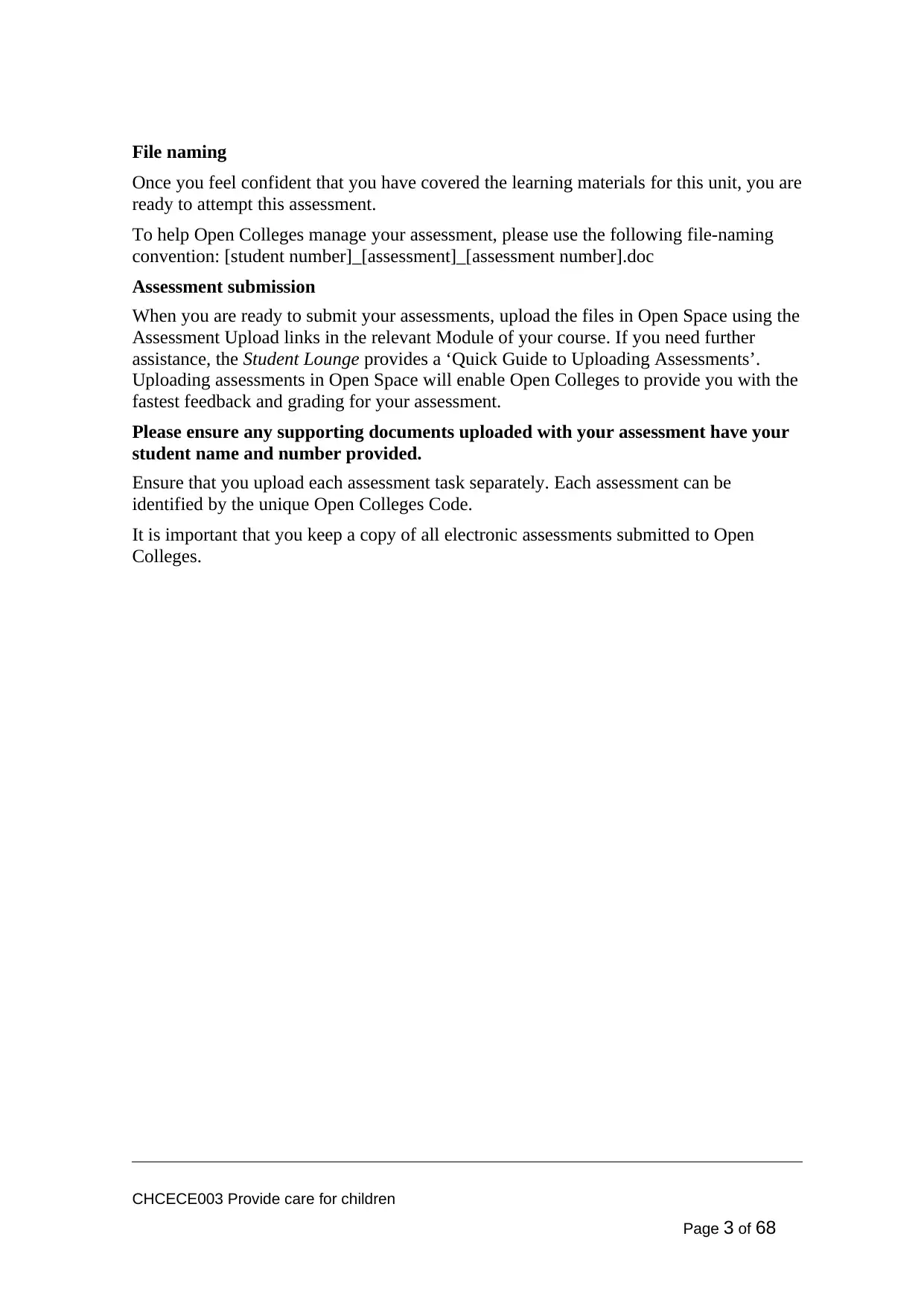
File naming
Once you feel confident that you have covered the learning materials for this unit, you are
ready to attempt this assessment.
To help Open Colleges manage your assessment, please use the following file-naming
convention: [student number]_[assessment]_[assessment number].doc
Assessment submission
When you are ready to submit your assessments, upload the files in Open Space using the
Assessment Upload links in the relevant Module of your course. If you need further
assistance, the Student Lounge provides a ‘Quick Guide to Uploading Assessments’.
Uploading assessments in Open Space will enable Open Colleges to provide you with the
fastest feedback and grading for your assessment.
Please ensure any supporting documents uploaded with your assessment have your
student name and number provided.
Ensure that you upload each assessment task separately. Each assessment can be
identified by the unique Open Colleges Code.
It is important that you keep a copy of all electronic assessments submitted to Open
Colleges.
CHCECE003 Provide care for children
Page 3 of 68
Once you feel confident that you have covered the learning materials for this unit, you are
ready to attempt this assessment.
To help Open Colleges manage your assessment, please use the following file-naming
convention: [student number]_[assessment]_[assessment number].doc
Assessment submission
When you are ready to submit your assessments, upload the files in Open Space using the
Assessment Upload links in the relevant Module of your course. If you need further
assistance, the Student Lounge provides a ‘Quick Guide to Uploading Assessments’.
Uploading assessments in Open Space will enable Open Colleges to provide you with the
fastest feedback and grading for your assessment.
Please ensure any supporting documents uploaded with your assessment have your
student name and number provided.
Ensure that you upload each assessment task separately. Each assessment can be
identified by the unique Open Colleges Code.
It is important that you keep a copy of all electronic assessments submitted to Open
Colleges.
CHCECE003 Provide care for children
Page 3 of 68
⊘ This is a preview!⊘
Do you want full access?
Subscribe today to unlock all pages.

Trusted by 1+ million students worldwide
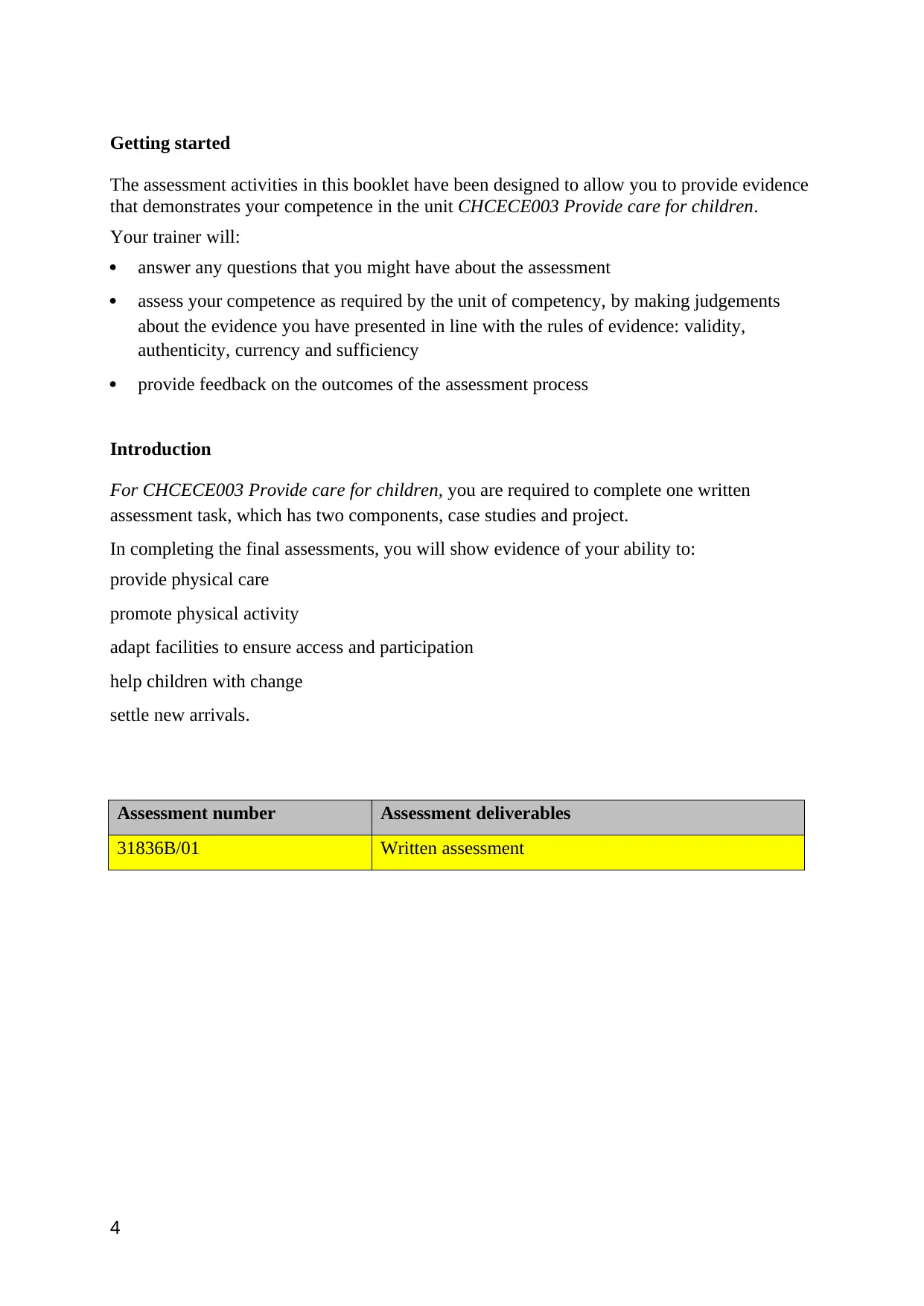
Getting started
The assessment activities in this booklet have been designed to allow you to provide evidence
that demonstrates your competence in the unit CHCECE003 Provide care for children.
Your trainer will:
answer any questions that you might have about the assessment
assess your competence as required by the unit of competency, by making judgements
about the evidence you have presented in line with the rules of evidence: validity,
authenticity, currency and sufficiency
provide feedback on the outcomes of the assessment process
Introduction
For CHCECE003 Provide care for children, you are required to complete one written
assessment task, which has two components, case studies and project.
In completing the final assessments, you will show evidence of your ability to:
provide physical care
promote physical activity
adapt facilities to ensure access and participation
help children with change
settle new arrivals.
Assessment number Assessment deliverables
31836B/01 Written assessment
4
The assessment activities in this booklet have been designed to allow you to provide evidence
that demonstrates your competence in the unit CHCECE003 Provide care for children.
Your trainer will:
answer any questions that you might have about the assessment
assess your competence as required by the unit of competency, by making judgements
about the evidence you have presented in line with the rules of evidence: validity,
authenticity, currency and sufficiency
provide feedback on the outcomes of the assessment process
Introduction
For CHCECE003 Provide care for children, you are required to complete one written
assessment task, which has two components, case studies and project.
In completing the final assessments, you will show evidence of your ability to:
provide physical care
promote physical activity
adapt facilities to ensure access and participation
help children with change
settle new arrivals.
Assessment number Assessment deliverables
31836B/01 Written assessment
4
Paraphrase This Document
Need a fresh take? Get an instant paraphrase of this document with our AI Paraphraser
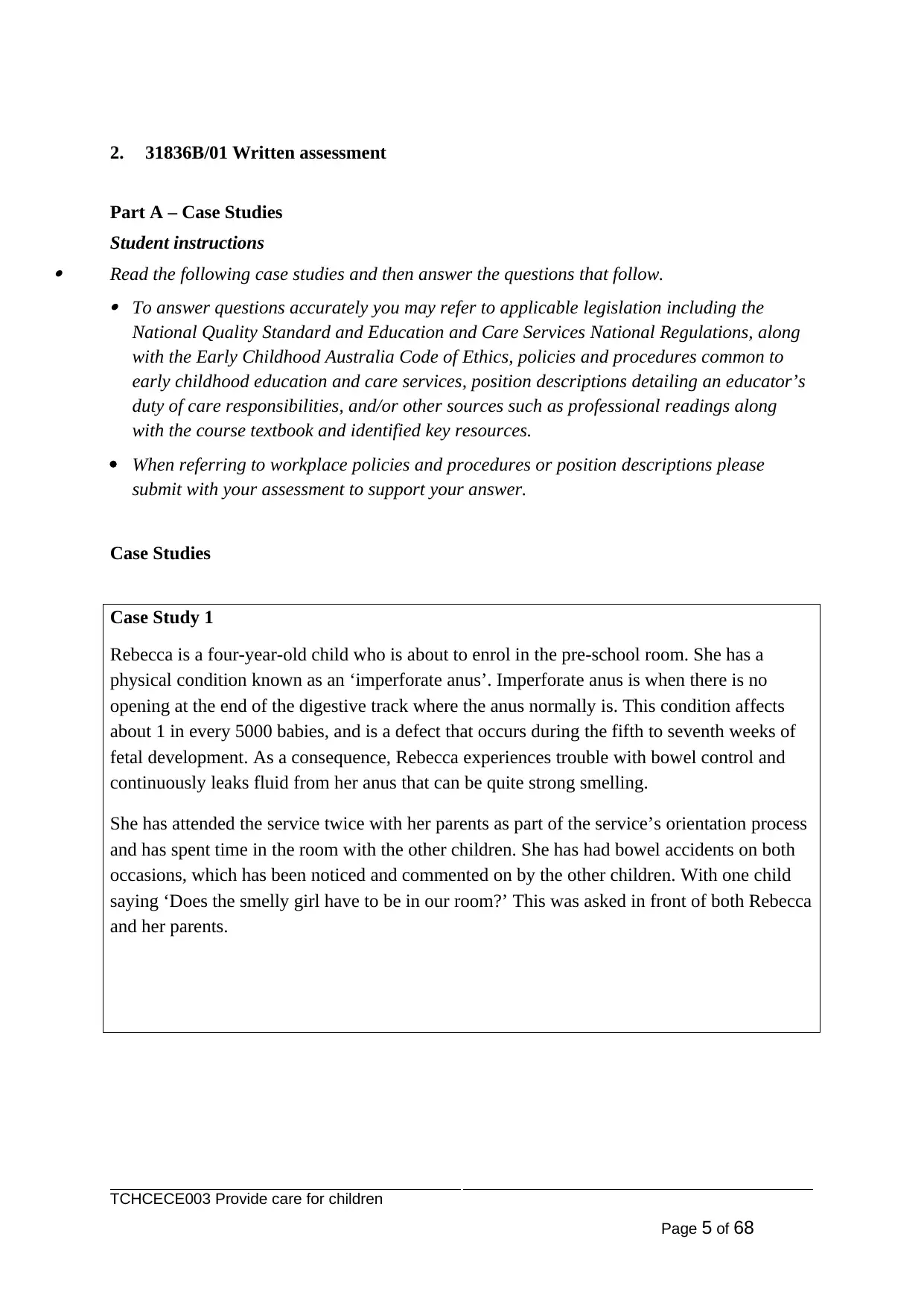
2. 31836B/01 Written assessment
Part A – Case Studies
Student instructions
Read the following case studies and then answer the questions that follow. To answer questions accurately you may refer to applicable legislation including the
National Quality Standard and Education and Care Services National Regulations, along
with the Early Childhood Australia Code of Ethics, policies and procedures common to
early childhood education and care services, position descriptions detailing an educator’s
duty of care responsibilities, and/or other sources such as professional readings along
with the course textbook and identified key resources.
When referring to workplace policies and procedures or position descriptions please
submit with your assessment to support your answer.
Case Studies
Case Study 1
Rebecca is a four-year-old child who is about to enrol in the pre-school room. She has a
physical condition known as an ‘imperforate anus’. Imperforate anus is when there is no
opening at the end of the digestive track where the anus normally is. This condition affects
about 1 in every 5000 babies, and is a defect that occurs during the fifth to seventh weeks of
fetal development. As a consequence, Rebecca experiences trouble with bowel control and
continuously leaks fluid from her anus that can be quite strong smelling.
She has attended the service twice with her parents as part of the service’s orientation process
and has spent time in the room with the other children. She has had bowel accidents on both
occasions, which has been noticed and commented on by the other children. With one child
saying ‘Does the smelly girl have to be in our room?’ This was asked in front of both Rebecca
and her parents.
TCHCECE003 Provide care for children
Page 5 of 68
Part A – Case Studies
Student instructions
Read the following case studies and then answer the questions that follow. To answer questions accurately you may refer to applicable legislation including the
National Quality Standard and Education and Care Services National Regulations, along
with the Early Childhood Australia Code of Ethics, policies and procedures common to
early childhood education and care services, position descriptions detailing an educator’s
duty of care responsibilities, and/or other sources such as professional readings along
with the course textbook and identified key resources.
When referring to workplace policies and procedures or position descriptions please
submit with your assessment to support your answer.
Case Studies
Case Study 1
Rebecca is a four-year-old child who is about to enrol in the pre-school room. She has a
physical condition known as an ‘imperforate anus’. Imperforate anus is when there is no
opening at the end of the digestive track where the anus normally is. This condition affects
about 1 in every 5000 babies, and is a defect that occurs during the fifth to seventh weeks of
fetal development. As a consequence, Rebecca experiences trouble with bowel control and
continuously leaks fluid from her anus that can be quite strong smelling.
She has attended the service twice with her parents as part of the service’s orientation process
and has spent time in the room with the other children. She has had bowel accidents on both
occasions, which has been noticed and commented on by the other children. With one child
saying ‘Does the smelly girl have to be in our room?’ This was asked in front of both Rebecca
and her parents.
TCHCECE003 Provide care for children
Page 5 of 68
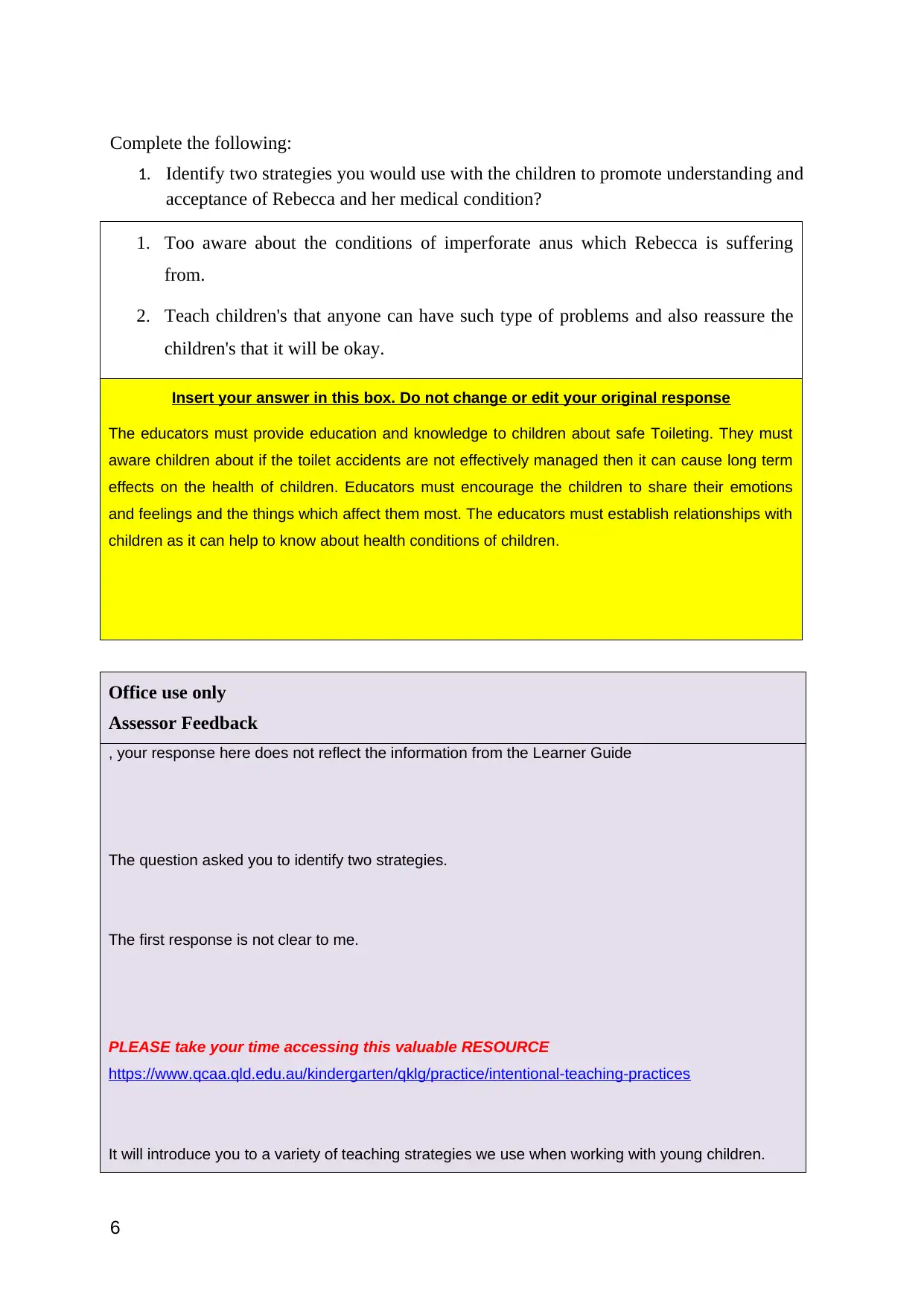
Complete the following:
1. Identify two strategies you would use with the children to promote understanding and
acceptance of Rebecca and her medical condition?
1. Too aware about the conditions of imperforate anus which Rebecca is suffering
from.
2. Teach children's that anyone can have such type of problems and also reassure the
children's that it will be okay.
Insert your answer in this box. Do not change or edit your original response
The educators must provide education and knowledge to children about safe Toileting. They must
aware children about if the toilet accidents are not effectively managed then it can cause long term
effects on the health of children. Educators must encourage the children to share their emotions
and feelings and the things which affect them most. The educators must establish relationships with
children as it can help to know about health conditions of children.
Office use only
Assessor Feedback
, your response here does not reflect the information from the Learner Guide
The question asked you to identify two strategies.
The first response is not clear to me.
PLEASE take your time accessing this valuable RESOURCE
https://www.qcaa.qld.edu.au/kindergarten/qklg/practice/intentional-teaching-practices
It will introduce you to a variety of teaching strategies we use when working with young children.
6
1. Identify two strategies you would use with the children to promote understanding and
acceptance of Rebecca and her medical condition?
1. Too aware about the conditions of imperforate anus which Rebecca is suffering
from.
2. Teach children's that anyone can have such type of problems and also reassure the
children's that it will be okay.
Insert your answer in this box. Do not change or edit your original response
The educators must provide education and knowledge to children about safe Toileting. They must
aware children about if the toilet accidents are not effectively managed then it can cause long term
effects on the health of children. Educators must encourage the children to share their emotions
and feelings and the things which affect them most. The educators must establish relationships with
children as it can help to know about health conditions of children.
Office use only
Assessor Feedback
, your response here does not reflect the information from the Learner Guide
The question asked you to identify two strategies.
The first response is not clear to me.
PLEASE take your time accessing this valuable RESOURCE
https://www.qcaa.qld.edu.au/kindergarten/qklg/practice/intentional-teaching-practices
It will introduce you to a variety of teaching strategies we use when working with young children.
6
⊘ This is a preview!⊘
Do you want full access?
Subscribe today to unlock all pages.

Trusted by 1+ million students worldwide
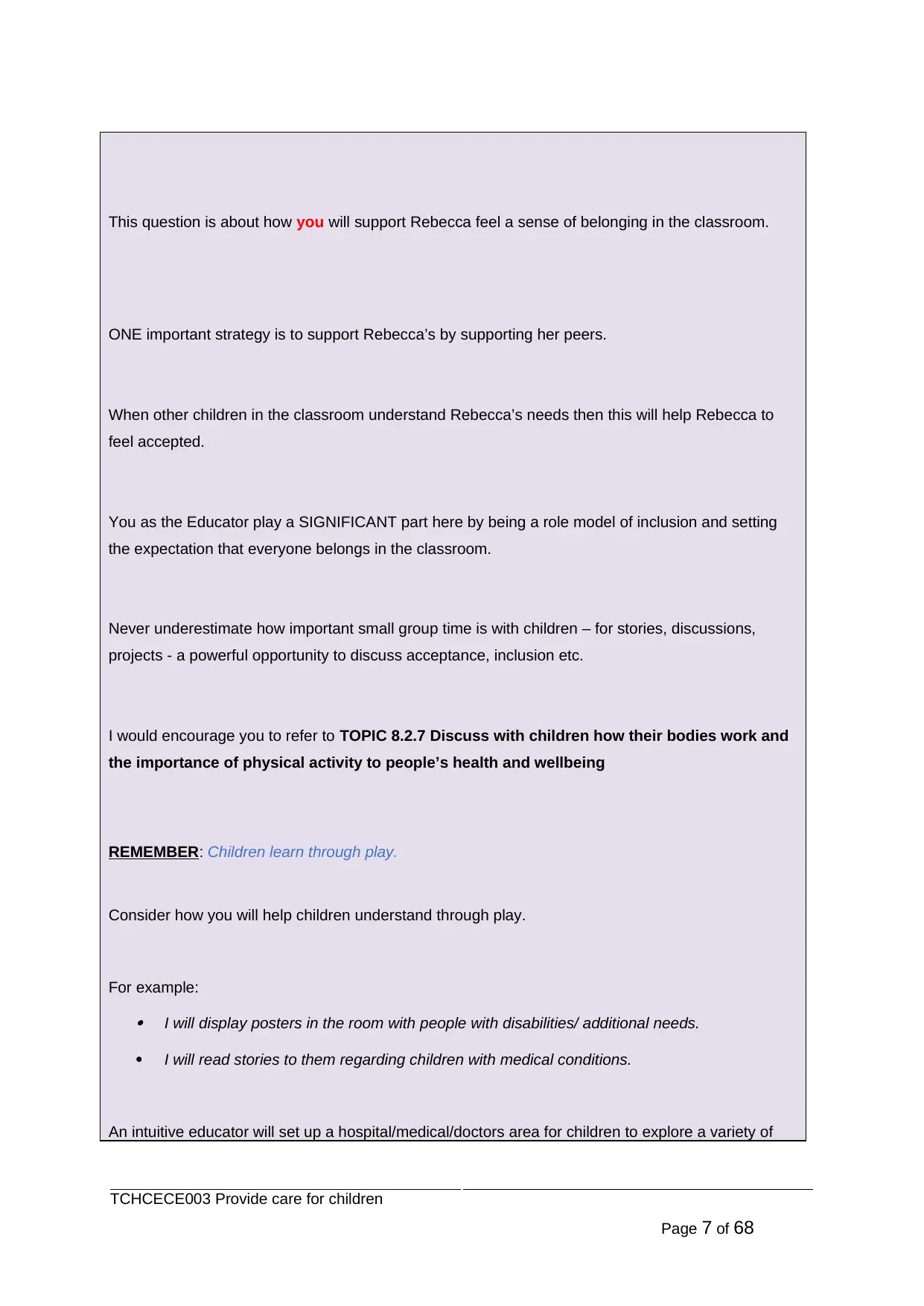
This question is about how you will support Rebecca feel a sense of belonging in the classroom.
ONE important strategy is to support Rebecca’s by supporting her peers.
When other children in the classroom understand Rebecca’s needs then this will help Rebecca to
feel accepted.
You as the Educator play a SIGNIFICANT part here by being a role model of inclusion and setting
the expectation that everyone belongs in the classroom.
Never underestimate how important small group time is with children – for stories, discussions,
projects - a powerful opportunity to discuss acceptance, inclusion etc.
I would encourage you to refer to TOPIC 8.2.7 Discuss with children how their bodies work and
the importance of physical activity to people’s health and wellbeing
REMEMBER: Children learn through play.
Consider how you will help children understand through play.
For example: I will display posters in the room with people with disabilities/ additional needs.
I will read stories to them regarding children with medical conditions.
An intuitive educator will set up a hospital/medical/doctors area for children to explore a variety of
TCHCECE003 Provide care for children
Page 7 of 68
ONE important strategy is to support Rebecca’s by supporting her peers.
When other children in the classroom understand Rebecca’s needs then this will help Rebecca to
feel accepted.
You as the Educator play a SIGNIFICANT part here by being a role model of inclusion and setting
the expectation that everyone belongs in the classroom.
Never underestimate how important small group time is with children – for stories, discussions,
projects - a powerful opportunity to discuss acceptance, inclusion etc.
I would encourage you to refer to TOPIC 8.2.7 Discuss with children how their bodies work and
the importance of physical activity to people’s health and wellbeing
REMEMBER: Children learn through play.
Consider how you will help children understand through play.
For example: I will display posters in the room with people with disabilities/ additional needs.
I will read stories to them regarding children with medical conditions.
An intuitive educator will set up a hospital/medical/doctors area for children to explore a variety of
TCHCECE003 Provide care for children
Page 7 of 68
Paraphrase This Document
Need a fresh take? Get an instant paraphrase of this document with our AI Paraphraser
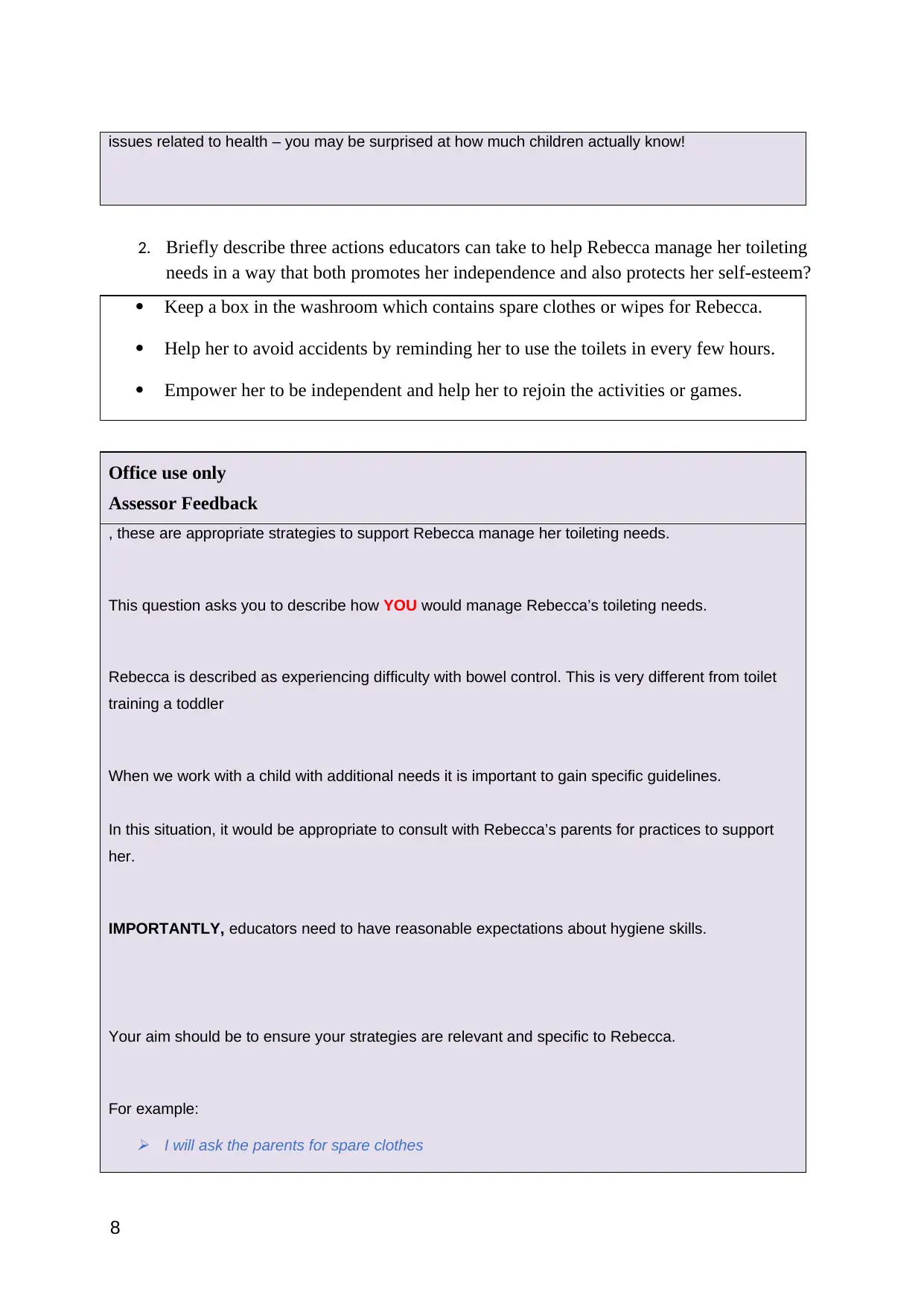
issues related to health – you may be surprised at how much children actually know!
2. Briefly describe three actions educators can take to help Rebecca manage her toileting
needs in a way that both promotes her independence and also protects her self-esteem?
Keep a box in the washroom which contains spare clothes or wipes for Rebecca.
Help her to avoid accidents by reminding her to use the toilets in every few hours.
Empower her to be independent and help her to rejoin the activities or games.
Office use only
Assessor Feedback
, these are appropriate strategies to support Rebecca manage her toileting needs.
This question asks you to describe how YOU would manage Rebecca’s toileting needs.
Rebecca is described as experiencing difficulty with bowel control. This is very different from toilet
training a toddler
When we work with a child with additional needs it is important to gain specific guidelines.
In this situation, it would be appropriate to consult with Rebecca’s parents for practices to support
her.
IMPORTANTLY, educators need to have reasonable expectations about hygiene skills.
Your aim should be to ensure your strategies are relevant and specific to Rebecca.
For example: I will ask the parents for spare clothes
8
2. Briefly describe three actions educators can take to help Rebecca manage her toileting
needs in a way that both promotes her independence and also protects her self-esteem?
Keep a box in the washroom which contains spare clothes or wipes for Rebecca.
Help her to avoid accidents by reminding her to use the toilets in every few hours.
Empower her to be independent and help her to rejoin the activities or games.
Office use only
Assessor Feedback
, these are appropriate strategies to support Rebecca manage her toileting needs.
This question asks you to describe how YOU would manage Rebecca’s toileting needs.
Rebecca is described as experiencing difficulty with bowel control. This is very different from toilet
training a toddler
When we work with a child with additional needs it is important to gain specific guidelines.
In this situation, it would be appropriate to consult with Rebecca’s parents for practices to support
her.
IMPORTANTLY, educators need to have reasonable expectations about hygiene skills.
Your aim should be to ensure your strategies are relevant and specific to Rebecca.
For example: I will ask the parents for spare clothes
8
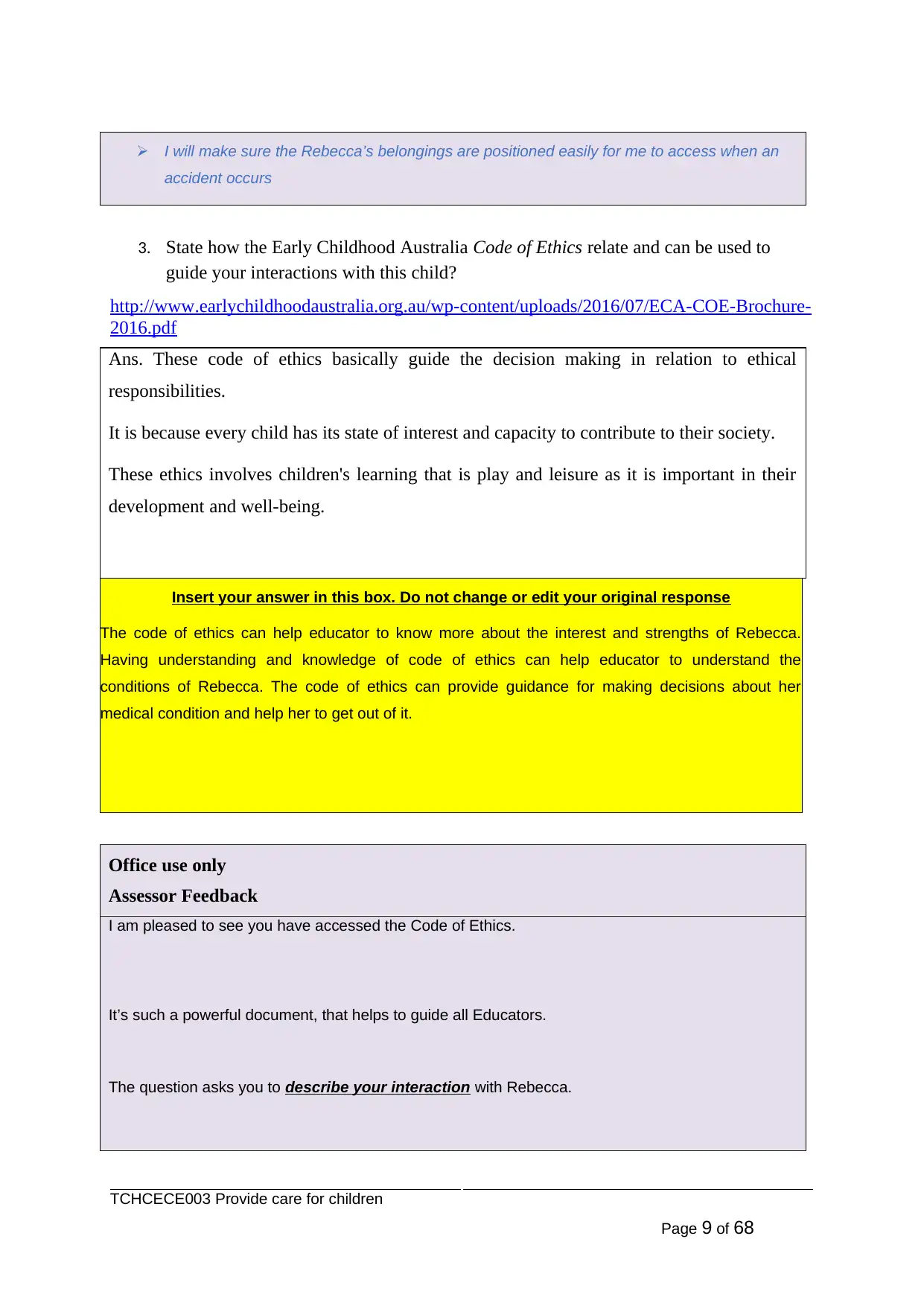
I will make sure the Rebecca’s belongings are positioned easily for me to access when an
accident occurs
3. State how the Early Childhood Australia Code of Ethics relate and can be used to
guide your interactions with this child?
http://www.earlychildhoodaustralia.org.au/wp-content/uploads/2016/07/ECA-COE-Brochure-
2016.pdf
Ans. These code of ethics basically guide the decision making in relation to ethical
responsibilities.
It is because every child has its state of interest and capacity to contribute to their society.
These ethics involves children's learning that is play and leisure as it is important in their
development and well-being.
Insert your answer in this box. Do not change or edit your original response
The code of ethics can help educator to know more about the interest and strengths of Rebecca.
Having understanding and knowledge of code of ethics can help educator to understand the
conditions of Rebecca. The code of ethics can provide guidance for making decisions about her
medical condition and help her to get out of it.
Office use only
Assessor Feedback
I am pleased to see you have accessed the Code of Ethics.
It’s such a powerful document, that helps to guide all Educators.
The question asks you to describe your interaction with Rebecca.
TCHCECE003 Provide care for children
Page 9 of 68
accident occurs
3. State how the Early Childhood Australia Code of Ethics relate and can be used to
guide your interactions with this child?
http://www.earlychildhoodaustralia.org.au/wp-content/uploads/2016/07/ECA-COE-Brochure-
2016.pdf
Ans. These code of ethics basically guide the decision making in relation to ethical
responsibilities.
It is because every child has its state of interest and capacity to contribute to their society.
These ethics involves children's learning that is play and leisure as it is important in their
development and well-being.
Insert your answer in this box. Do not change or edit your original response
The code of ethics can help educator to know more about the interest and strengths of Rebecca.
Having understanding and knowledge of code of ethics can help educator to understand the
conditions of Rebecca. The code of ethics can provide guidance for making decisions about her
medical condition and help her to get out of it.
Office use only
Assessor Feedback
I am pleased to see you have accessed the Code of Ethics.
It’s such a powerful document, that helps to guide all Educators.
The question asks you to describe your interaction with Rebecca.
TCHCECE003 Provide care for children
Page 9 of 68
⊘ This is a preview!⊘
Do you want full access?
Subscribe today to unlock all pages.

Trusted by 1+ million students worldwide
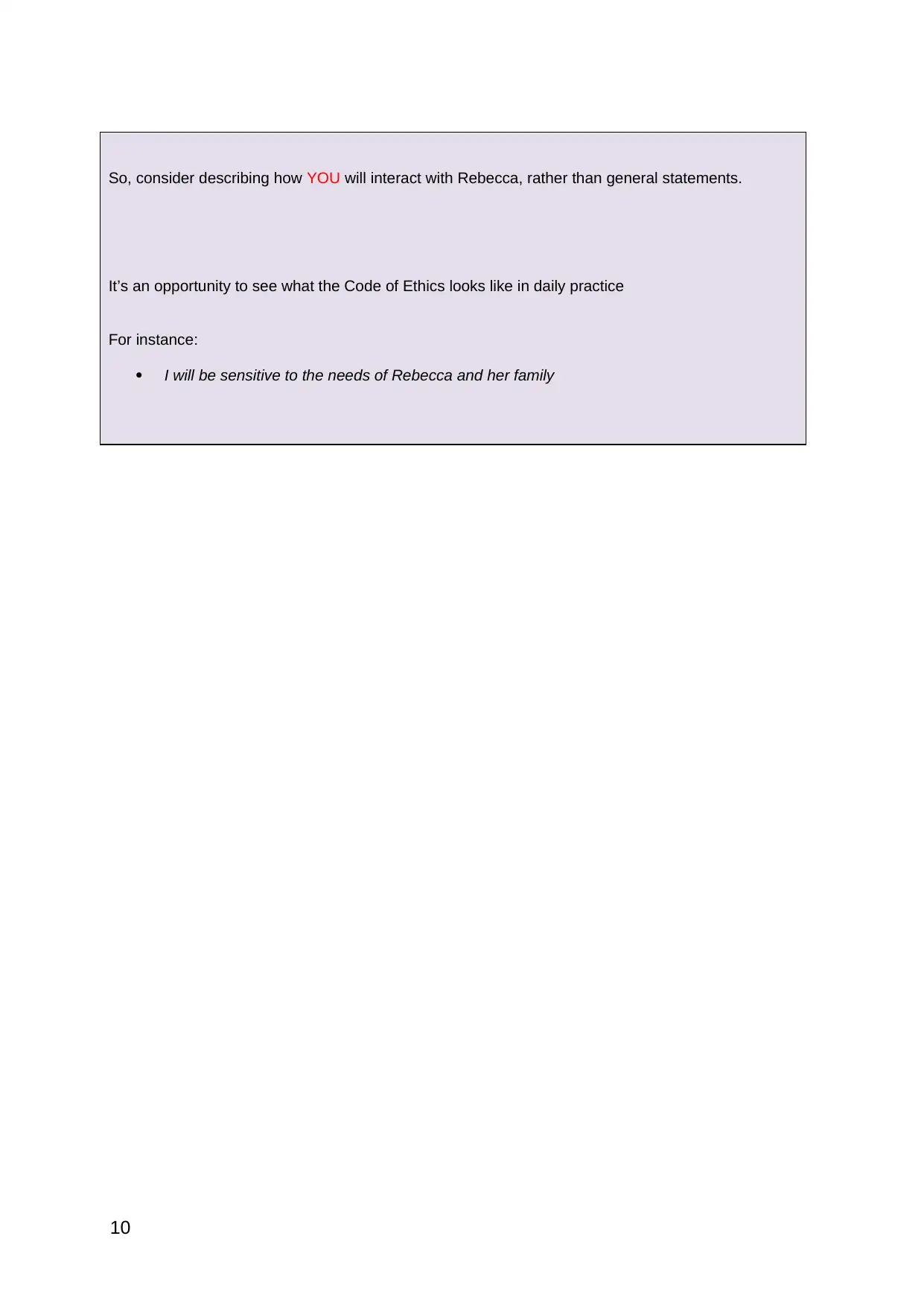
So, consider describing how YOU will interact with Rebecca, rather than general statements.
It’s an opportunity to see what the Code of Ethics looks like in daily practice
For instance:
I will be sensitive to the needs of Rebecca and her family
10
It’s an opportunity to see what the Code of Ethics looks like in daily practice
For instance:
I will be sensitive to the needs of Rebecca and her family
10
Paraphrase This Document
Need a fresh take? Get an instant paraphrase of this document with our AI Paraphraser
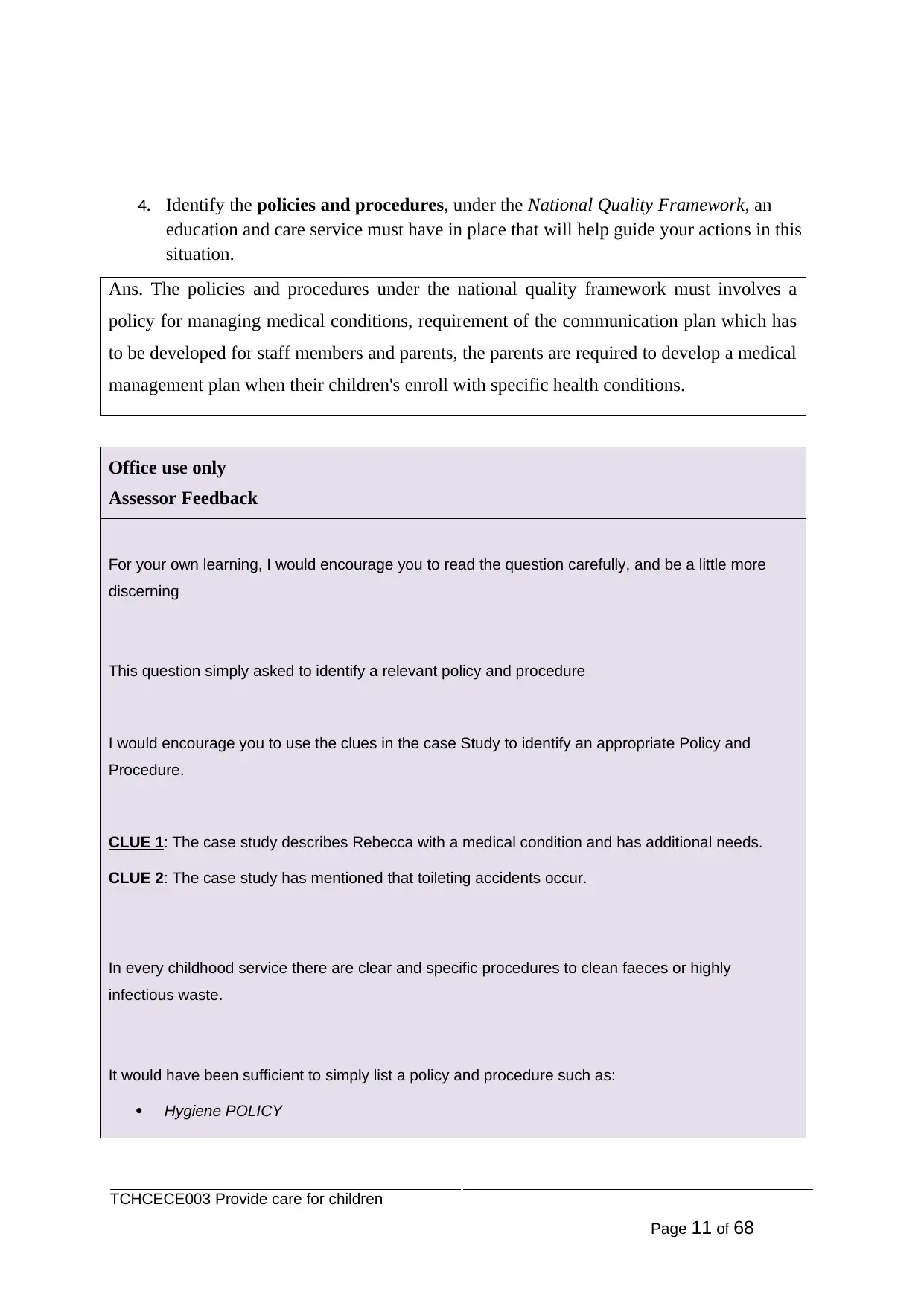
4. Identify the policies and procedures, under the National Quality Framework, an
education and care service must have in place that will help guide your actions in this
situation.
Ans. The policies and procedures under the national quality framework must involves a
policy for managing medical conditions, requirement of the communication plan which has
to be developed for staff members and parents, the parents are required to develop a medical
management plan when their children's enroll with specific health conditions.
Office use only
Assessor Feedback
For your own learning, I would encourage you to read the question carefully, and be a little more
discerning
This question simply asked to identify a relevant policy and procedure
I would encourage you to use the clues in the case Study to identify an appropriate Policy and
Procedure.
CLUE 1: The case study describes Rebecca with a medical condition and has additional needs.
CLUE 2: The case study has mentioned that toileting accidents occur.
In every childhood service there are clear and specific procedures to clean faeces or highly
infectious waste.
It would have been sufficient to simply list a policy and procedure such as:
Hygiene POLICY
TCHCECE003 Provide care for children
Page 11 of 68
education and care service must have in place that will help guide your actions in this
situation.
Ans. The policies and procedures under the national quality framework must involves a
policy for managing medical conditions, requirement of the communication plan which has
to be developed for staff members and parents, the parents are required to develop a medical
management plan when their children's enroll with specific health conditions.
Office use only
Assessor Feedback
For your own learning, I would encourage you to read the question carefully, and be a little more
discerning
This question simply asked to identify a relevant policy and procedure
I would encourage you to use the clues in the case Study to identify an appropriate Policy and
Procedure.
CLUE 1: The case study describes Rebecca with a medical condition and has additional needs.
CLUE 2: The case study has mentioned that toileting accidents occur.
In every childhood service there are clear and specific procedures to clean faeces or highly
infectious waste.
It would have been sufficient to simply list a policy and procedure such as:
Hygiene POLICY
TCHCECE003 Provide care for children
Page 11 of 68
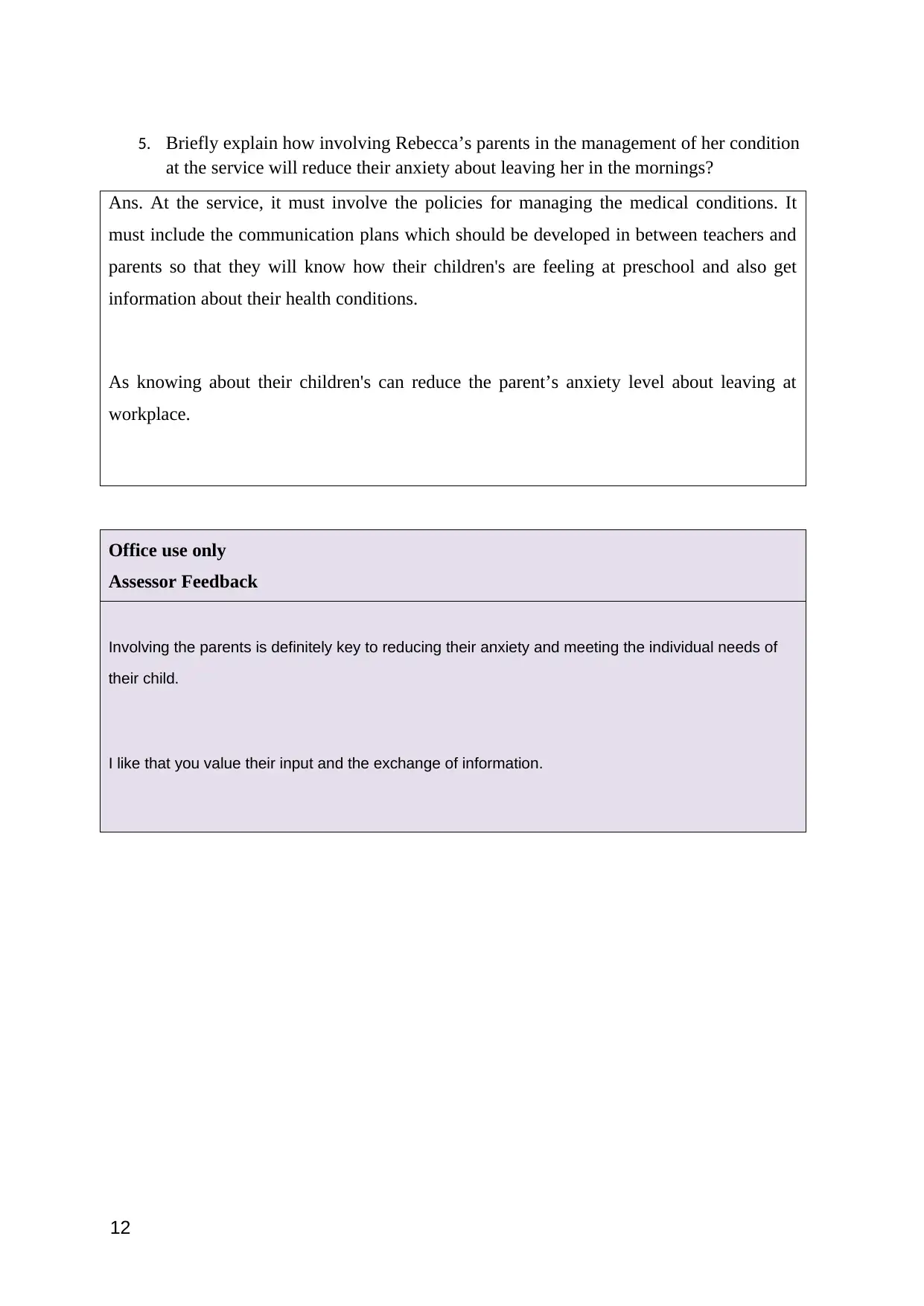
5. Briefly explain how involving Rebecca’s parents in the management of her condition
at the service will reduce their anxiety about leaving her in the mornings?
Ans. At the service, it must involve the policies for managing the medical conditions. It
must include the communication plans which should be developed in between teachers and
parents so that they will know how their children's are feeling at preschool and also get
information about their health conditions.
As knowing about their children's can reduce the parent’s anxiety level about leaving at
workplace.
Office use only
Assessor Feedback
Involving the parents is definitely key to reducing their anxiety and meeting the individual needs of
their child.
I like that you value their input and the exchange of information.
12
at the service will reduce their anxiety about leaving her in the mornings?
Ans. At the service, it must involve the policies for managing the medical conditions. It
must include the communication plans which should be developed in between teachers and
parents so that they will know how their children's are feeling at preschool and also get
information about their health conditions.
As knowing about their children's can reduce the parent’s anxiety level about leaving at
workplace.
Office use only
Assessor Feedback
Involving the parents is definitely key to reducing their anxiety and meeting the individual needs of
their child.
I like that you value their input and the exchange of information.
12
⊘ This is a preview!⊘
Do you want full access?
Subscribe today to unlock all pages.

Trusted by 1+ million students worldwide
1 out of 68
Related Documents
Your All-in-One AI-Powered Toolkit for Academic Success.
+13062052269
info@desklib.com
Available 24*7 on WhatsApp / Email
![[object Object]](/_next/static/media/star-bottom.7253800d.svg)
Unlock your academic potential
Copyright © 2020–2026 A2Z Services. All Rights Reserved. Developed and managed by ZUCOL.





